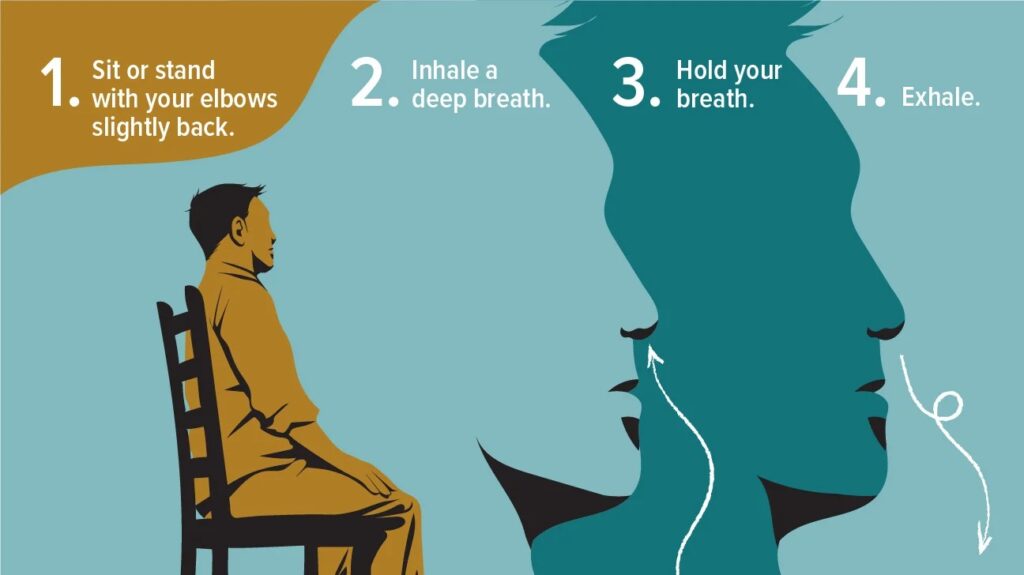Table of Contents

In today’s fast-paced world, stress has become a common and often overwhelming experience for many people. However, the good news is that there are effective stress management techniques that can help us navigate through these challenging times. In this blog, we will explore various strategies and approaches to alleviate stress and promote overall well-being. Whether you’re a student, a professional, or a homemaker, incorporating these stress management techniques into your daily routine can make a significant difference in your life.
By understanding and implementing these techniques, you will gain valuable tools to combat stress and improve your mental and emotional resilience. From relaxation exercises and mindfulness practices to time management and self-care routines, we will delve into an array of stress management strategies that are accessible to everyone. By prioritizing your mental health and adopting these techniques, you can reduce stress levels, enhance your productivity, and cultivate a greater sense of inner calm and balance.
Join us on this journey as we explore the world of stress management techniques. Discover effective ways to cope with stress, regain control over your life, and embrace a healthier, more balanced lifestyle. Get ready to embark on a transformative path towards a stress-free and fulfilling existence. So, let’s dive in and explore the wonderful world of stress management techniques together.
Understanding Stress: The Impact and Importance of Management

Stress is a common experience that impacts people of all ages and backgrounds. It can be caused by various factors such as work, relationships, financial issues, health concerns, and more. If not addressed, stress can lead to negative physical, mental, and emotional effects on a person’s well-being. However, by understanding the impact of stress and adopting effective stress management techniques, one can lead a healthier and more balanced life.
The impact of stress can manifest in various ways such as headaches, muscle tension, fatigue, and sleep disturbances. It can also lead to more serious health concerns like high blood pressure, heart disease, and depression. The negative effects of stress can also extend to personal relationships, work performance, and overall quality of life. Therefore, it is important to recognize and address stress in a timely and effective manner.
Stress management techniques can help individuals cope with stress and prevent it from negatively impacting their lives. These techniques can include relaxation exercises such as deep breathing, meditation, and yoga. They can also involve lifestyle changes like regular exercise, healthy eating habits, and getting enough rest. Additionally, time management techniques, seeking social support, and practicing positive self-talk can also be effective in managing stress.
It is important to note that not all stress is bad. In fact, some stress can be beneficial and motivate individuals to achieve their goals and perform better. However, it is important to recognize when stress becomes overwhelming and affects one’s well-being. In such cases, seeking professional help from a therapist or counselor may be necessary.
Identifying Sources of Stress
Stress is a common part of our lives, and it can stem from various sources. By understanding and identifying these sources of stress, we can take proactive steps to manage and reduce its impact on our well-being. Let’s explore some common sources of stress and how they can affect us.

- Work-related stress: Many individuals experience stress in their professional lives. High workloads, demanding deadlines, conflicts with colleagues, and job insecurity can all contribute to work-related stress. It’s important to recognize the signs of stress in the workplace and take steps to manage it effectively.
- Personal relationships: Our relationships, whether with family, friends, or romantic partners, can be a significant source of stress. Conflicts, communication breakdowns, and unmet expectations can all contribute to relationship stress. Building healthy communication skills, setting boundaries, and seeking support can help in managing stress in relationships.
- Financial pressures: Financial difficulties, such as debt, unemployment, or struggling to make ends meet, can be incredibly stressful. The constant worry about money and the inability to meet financial obligations can lead to significant stress. Seeking financial advice, creating a budget, and exploring ways to increase income or reduce expenses can help alleviate financial stress.
- Health concerns: Health-related issues, whether personal or that of a loved one, can generate stress. Chronic illnesses, medical procedures, or concerns about our own well-being can take a toll on our mental and emotional health. Prioritizing self-care, seeking medical help, and building a support network can assist in managing stress related to health concerns.
- Life transitions: Major life changes, such as moving to a new city, starting a new job, getting married, or becoming a parent, can bring about stress. Even positive changes can be overwhelming and trigger stress responses. Recognizing the stress associated with life transitions and seeking support from loved ones can aid in managing stress during these periods.
- Time management and overload: Feeling overwhelmed due to a lack of time, taking on too many responsibilities, or struggling to meet multiple deadlines can contribute to stress. Learning effective time management techniques, prioritizing tasks, and delegating when possible can help in reducing stress caused by overload.
- Environmental factors: Our physical environment can also impact our stress levels. Noise pollution, overcrowding, living in an unsafe neighborhood, or dealing with a difficult living situation can all contribute to stress. Identifying these environmental stressors and seeking ways to create a more peaceful and supportive environment can be beneficial.
Proven Stress Management Techniques
1. Mindfulness Meditation

Mindfulness meditation is a powerful and effective Stress Management Techniques for managing stress and promoting overall well-being. It involves intentionally focusing one’s attention on the present moment, without judgment or attachment to thoughts or emotions. By practicing mindfulness meditation, individuals can cultivate a sense of calm, reduce stress levels, and enhance their overall mental and emotional resilience.
To practice mindfulness meditation, find a quiet and comfortable space where you can sit or lie down. Close your eyes and begin by taking a few deep breaths, allowing your body to relax. Bring your attention to the sensations of your breath as you inhale and exhale, without trying to control or change it. As you continue to breathe, gently direct your attention to the physical sensations in your body. Notice any areas of tension or discomfort and allow them to soften and release with each exhale. Be aware of the sensations of your body making contact with the ground or chair, feeling grounded and supported.
Next, shift your attention to your thoughts and emotions. Without judgment or attachment, simply observe them as they arise and pass. Acknowledge the thoughts and emotions without getting caught up in them or trying to change them. Allow them to come and go, like clouds drifting across the sky.
If your mind starts to wander, gently bring it back to the present moment by refocusing on your breath or the sensations in your body. It’s normal for the mind to wander during meditation, so be patient and compassionate with yourself as you bring your attention back each time.
Practicing mindfulness meditation regularly can have numerous benefits for stress management. It helps to create a space of mental clarity and calm, allowing individuals to respond to stressors more effectively. By developing a non-reactive and non-judgmental mindset, mindfulness meditation can help individuals break free from negative thought patterns and reduce anxiety.
Moreover, mindfulness meditation cultivates self-awareness, enabling individuals to recognize the signs of stress in their bodies and minds. This heightened awareness allows for early intervention, as individuals can take proactive steps to address stress before it becomes overwhelming. Research has shown that consistent mindfulness meditation practice can lead to improved emotional regulation, reduced rumination, and increased overall well-being. It promotes a sense of inner peace and contentment, even in the face of external challenges.
Incorporating mindfulness meditation into daily life doesn’t have to be time-consuming. Even just a few minutes of practice each day can yield significant benefits. Consider integrating mindfulness meditation into your morning routine, during breaks, or before bedtime.
2. Deep Breathing Exercises

Deep breathing exercises are a simple yet powerful technique for managing stress and promoting relaxation. It involves taking slow, deep breaths, filling the lungs with air and exhaling slowly. By practicing deep breathing exercises, individuals can reduce stress levels, calm the mind and body, and enhance overall well-being.
To practice deep breathing exercises, find a quiet and comfortable place to sit or lie down. Close your eyes and take a few deep breaths, inhaling slowly through the nose and exhaling through the mouth. Focus your attention on the sensation of air moving in and out of your body.
Next, place one hand on your belly and the other on your chest. As you inhale, feel your belly expand as you fill your lungs with air. As you exhale, slowly release the air from your lungs, feeling your belly and chest deflate. Repeat this breathing pattern for several minutes, taking slow and steady breaths.
Deep breathing exercises promote relaxation by activating the parasympathetic nervous system, which slows down the heart rate and reduces muscle tension. It can also help to lower blood pressure, reduce anxiety, and improve overall mood.
Incorporating deep breathing exercises into daily life doesn’t have to be time-consuming. Even just a few minutes of practice each day can yield significant benefits. Consider taking a few deep breaths before stressful situations, during breaks, or before bedtime.
Moreover, deep breathing exercises can be combined with other relaxation techniques, such as guided imagery or progressive muscle relaxation, to enhance their effectiveness. By combining deep breathing with visualization or muscle relaxation, individuals can create a more holistic approach to stress management.
3. Physical Activity and Exercise
Regular physical activity is a powerful stress reliever. Exercise helps release endorphins, the body’s natural mood lifters, and reduces cortisol levels, which are elevated during times of stress.
4. Adequate Sleep Hygiene
Quality sleep plays a vital role in stress management. Establishing a consistent sleep schedule, creating a comfortable sleep environment, and practicing relaxation techniques before bedtime can significantly improve sleep quality and reduce stress levels.
5. Healthy Nutrition Choices
A well-balanced diet rich in fruits, vegetables, lean proteins, and whole grains provides essential nutrients that support the body during stressful periods. Avoiding excessive caffeine, sugar, and alcohol can also help stabilize mood and energy levels.
6. Time Management and Prioritization
Effective time management allows individuals to allocate time for tasks and responsibilities, reducing the likelihood of feeling overwhelmed. Prioritizing tasks based on urgency and importance can help create a sense of control and reduce stress.
7. Social Support and Connections
Maintaining strong social connections and seeking support from friends, family, or support groups can provide emotional reassurance and practical assistance during stressful times. Sharing experiences and feelings with others fosters a sense of belonging and reduces feelings of isolation.
Implementing Stress Management Strategies
To effectively manage stress, it is crucial to create a personalized plan that incorporates the techniques mentioned above. Experimenting with different strategies and identifying what works best for individual needs and preferences is key to long-term stress reduction.
Management Plan
Managing stress is essential for maintaining overall well-being and reducing the negative impact it can have on our physical and mental health. One effective approach is to develop a personalized stress management plan tailored to your individual needs and preferences. This plan can help you identify and address stressors, implement healthy coping strategies, and foster a sense of balance and resilience. Here are some steps to create your personalized stress management plan:
- Identify Your Stressors: Start by identifying the specific factors that contribute to your stress. These may include work-related pressures, relationship issues, financial concerns, or health challenges. Take some time to reflect on what triggers your stress response and make a list of these stressors.
- Assess Your Coping Strategies: Evaluate your current coping mechanisms and determine their effectiveness. Are they healthy and sustainable, or do they involve unhealthy habits such as excessive alcohol consumption or emotional eating? Identify which coping strategies work well for you and which ones may need to be modified or replaced.
- Prioritize Self-Care: Self-care plays a crucial role in stress management. Incorporate activities that promote relaxation and rejuvenation into your routine. This can include engaging in hobbies you enjoy, practicing mindfulness or meditation, getting regular exercise, ensuring sufficient sleep, and maintaining a balanced diet.
- Set Realistic Goals: Establish realistic goals for yourself, both short-term and long-term. Break larger tasks into smaller, manageable steps to prevent overwhelm. Celebrate your achievements along the way, no matter how small, to boost motivation and reinforce positive habits.
- Build a Support Network: Surround yourself with a supportive network of friends, family, or professionals who can provide guidance and encouragement. Share your stress management goals with them and seek their support when needed. Consider joining support groups or seeking professional help if necessary.
- Practice Time Management: Efficiently managing your time can significantly reduce stress. Prioritize tasks, delegate when possible, and learn to say no to avoid taking on too much. Set boundaries to maintain a healthy work-life balance and allocate time for relaxation and self-care.
- Implement Stress Reduction Techniques: Explore various stress reduction techniques and find what works best for you. These may include deep breathing exercises, progressive muscle relaxation, guided imagery, or engaging in activities that promote relaxation and mindfulness.
- Monitor Your Progress: Regularly assess your stress levels and the effectiveness of your stress management strategies. Keep a journal to track your emotions, triggers, and coping mechanisms. Adjust your plan as needed to ensure it remains relevant and effective.
Remember, creating a personalized stress management plan is a continuous process. It requires self-awareness, flexibility, and a commitment to self-care. Be patient with yourself as you navigate different strategies and adapt them to fit your unique circumstances. With time and practice, you can develop a stress management plan that empowers you to lead a healthier, more balanced life.
Conclusion
In conclusion, effective stress management is essential for maintaining optimal well-being. By incorporating mindfulness meditation, deep breathing exercises, physical activity, adequate sleep, healthy nutrition, time management, and social support into daily routines, individuals can significantly reduce stress levels and improve overall quality of life. Implementing these strategies consistently and adjusting as needed will pave the way for a healthier and more balanced lifestyle.
Read More: Best Foods that Boost Gut Health and Mental Well-being

